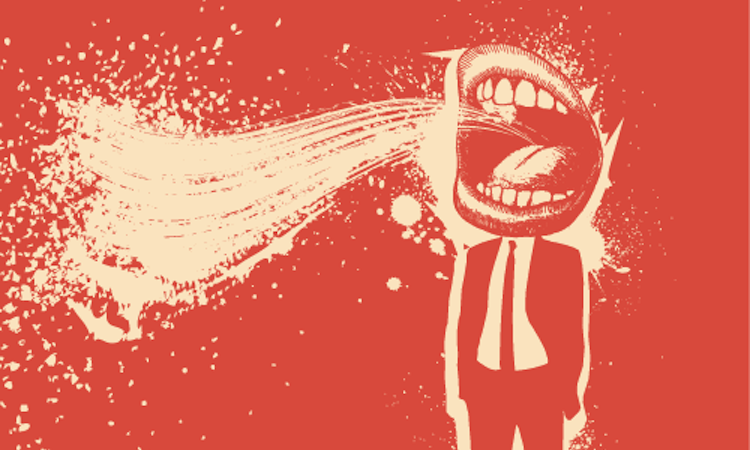
Becky’s inner critic is incredibly chatty and opinionated. From a perch high above the present moment, she evaluates every action, reaction, and intention Becky has from a shoulda/woulda/coulda perspective. Sometimes Becky manages things appropriately and senses her approval in the silence. More often than not, however, her inner critic is constantly telling Becky what she did wrong and Becky’s constantly wishing she would shut up.
I bet you, too, have a little gremlin that sits on your shoulder whispering such obscenities as, “You’re no good!”and “You’re worthless!” and “You could have done better!” While it’s a voice that can drive you crazy with self-doubt, your inner critic is actually hardwired to help you learn, a fact underscored by research published in the Journal of Neuroscience that directly examines the inner critic and its role in learning.
Robert Reinhart, a Ph.D. candidate at Vanderbilt University, wanted to “reach into your brain and casually control your inner critic.” Together with colleague Geoffrey Woodman, assistant professor of psychology, he devised an experiment that would deliberately influence learning ability through a mild electrical current directly applied to the brain. Depending on the direction of the current, they suspected they could amplify or suppress the ability to learn. They were right.
The Science Behind Your Inner Critic
Just seconds after you make a mistake, a jolt of negative voltage emanates from your medial-frontal cortex. Scientists widely believe that this is the origin of your instinctive “oops!” response. Reinhart and Woodman’s idea was to test the hypothesis that the instinctive “oops!” is actually a part of your brain’s hardwired learning process. They designed their experiment to test both the idea that you can control your brain’s mistake response and that the effect of that response could be intentionally increased or decreased, depending on the direction of the current. They also wanted to see how long the effects could last.
To carry out the experiment, the researchers placed one electrode (conducted by saline-soaked sponges) on the crown of the head and a second on the cheek of participants. Then they applied 20 minutes of gentle transcranial direct current stimulation in random directions: anodal (traveling from the crown of the head to the cheek), cathodal (from the cheek to the crown), or a placebo. At the end of 20 minutes, subjects were given a learning task during which scientists measured their electrical brain activity with an electroencephalogram. In this way researchers could see how the brain changed as the subjects made mistakes; most important, they could see how brain activities responded to the influence of electrical stimulation.
The results of the study imply the importance of your inner critic: In the presence of the anodal current, the “oops!” spike of negative voltage was almost two times the usual. These subjects made fewer mistakes and learned more quickly. With the application of cathodal current, the opposite results occurred—and the effects lasted up to five hours and transferred to other tasks. Interpreting these findings, Reinhart says, “So when we up-regulate [the “oops!”] process, we can make you more cautious, less error-prone, more adaptable to new or changing situations.”
Your inner critic, then, is important to your ability to learn and be flexible—your ability to survive—which makes it all too clear that truly succeeding in life means finding ways to work with, rather than against, the know-it-all in your head.
How to Constructively Collaborate with Your Inner Critic
The biggest problem in collaborating with your inner critic lies in a problem of language: tone, vocabulary, and delivery. A rough, caveman sort of mentality (“You idiot, don’t you see the tiger coming at you?!”), the inner critic voice gets your attention through pain, panic, and a pugnacious energy—all things that make you cringe and pull away, which makes it hard to hear the content (what’s to be learned) behind the message (of disapproval). There are, however, simple ways to renegotiate your relationship with your inner critic that can lead to a more positive interaction that both engages and even amplifies learning.
Acknowledge and appreciate. The negative jolt of inner-critic energy masks its positive benefits. Interrupting the instinctive shy-away from the pain happens through implementing a habit of acknowledgment and appreciation—that is, recognizing your inner critic’s motivation and appreciating what she’s trying to do. For example, when your inner critic pipes up, say to yourself, “There’s that part of me that wants to keep me safe and help me learn!” With this perspective shift, you can focus on the learning that needs to be done versus the unkind way the need for it is delivered.
Separate criticism of the moment from your entire being. Your inner critic rises up to make assessments in response to specific experience. While the criticism can feel like an ooze that spreads over your whole being, the situation from which it originates represents only one aspect of who you are in any moment. Supportively applying the criticism means separating it from a metaview of who you are and applying it instead to a microview of the moment you’re in. Ask, “How can I change the circumstances of this moment?” For example, if the critical message is one of worthlessness, develop a plan for taking one action that makes you more worthy in that moment (rather than believe that worthlessness defines your entire self for your whole life).
Teach your inner critic to reframe criticism into coaching. Because the inner-critic voice is unkind, it all too often usurps your power. In truth, however, you are equal. When you stand up to your inner critic and redefine the dialogue, you can change both what’s said and the results. For example, you can train your shoulda/woulda/coulda critic to a next-time-let’s-try-this mentor. Implementing a rephrase habit immediately reduces the negative feelings while retaining the educational message. “You should have taken the highway to avoid this local traffic, dummy!” becomes, “Next time, let’s avoid local traffic by immediately getting on the highway.”
While you may wish your inner critic would go on an extended vacation, Reinhart and Woodman’s research shows how incredibly valuable the “oops!” instinct is and its critical role in life. Becky’s inner critic was her blessing and her curse, both helping Becky learn and so deeply cutting her down that sometimes she became inert. Today, Becky’s in the process of renegotiating that critical connection and finding relief, plus a new freedom. You can do that too. When you become a partner to your critic, embracing the “oops!” and modifying the message, you develop a relationship that converts criticism into quicker, long-lasting learning processes that encourage you to become better at who you are, how you live, and what you do.


